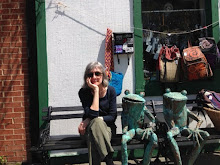This past year I unearthed a large stack of old letters from my best friend.
She and I have been friends since we were about twelve years old! These letters date back to when we were teenagers in high school and college, in the 1970s.
Re-reading these letters has been a remarkable experience. Not only is it a relief to find that the various exploits which once brought us so much angst no longer hold any emotional juice - but even more gratifying is the joy I experience, feeling the depth of my friend's love for me. All these decades later that voice of love comes through in these letters loud and clear.
There is one letter in particular which moved me to tears. Apparently responding to something I had complained of in my previous letter, my friend wrote an intense apology and pledge to change her behavior - because, she said, she valued my friendship so highly.
Teshuvah - which literally means returning, or turning back - involves the honest admission that we've done something regrettable. We feel moved to apologize for the hurt we may have caused, and express our sincere intention to behave differently in the future. There is an ancient midrash, a teaching of the early rabbis from the first century of the common era, which tells us that teshuvah was one of the seven things that were created before the creation of the world.
What the rabbis were trying to say, I think, is that the process of teshuvah is woven into the essence of reality. We cannot help but make mistakes - and we are hardwired, if you will, to learn from those mistakes and to try again and again and again. This is, among other things, what it means to be human.
The challenge, as I see it, is to do this endless self-correction with compassion. To say that teshuvah has existed from before the beginning, is to say that the process of teshuvah is natural and unavoidable and doesn't have to be a problem. The suffering we experience when we berate ourselves for our lack of perfection - that suffering is self-inflicted and unnecessary. This is what Buddhist teachers mean when they say "suffering is optional."
Hebrew scholars have pointed out that the ancient Hebrew word that we translate as "sin" - chet - actually comes from a term in archery for "missing the mark." The pain of missing the mark is real - when we make mistakes, we sometimes hurt others and ourselves. In doing teshuvah, the challenge is to have compassion both for others and for ourselves, and to remember that in any given moment we are doing the best we can. How could it be otherwise? And at the same time, paradoxically, the possibility for change is always present.
The High Holidays are approaching. It's not too early to start thinking about how we've missed the mark this past year.
She and I have been friends since we were about twelve years old! These letters date back to when we were teenagers in high school and college, in the 1970s.
Re-reading these letters has been a remarkable experience. Not only is it a relief to find that the various exploits which once brought us so much angst no longer hold any emotional juice - but even more gratifying is the joy I experience, feeling the depth of my friend's love for me. All these decades later that voice of love comes through in these letters loud and clear.
There is one letter in particular which moved me to tears. Apparently responding to something I had complained of in my previous letter, my friend wrote an intense apology and pledge to change her behavior - because, she said, she valued my friendship so highly.
Teshuvah - which literally means returning, or turning back - involves the honest admission that we've done something regrettable. We feel moved to apologize for the hurt we may have caused, and express our sincere intention to behave differently in the future. There is an ancient midrash, a teaching of the early rabbis from the first century of the common era, which tells us that teshuvah was one of the seven things that were created before the creation of the world.
What the rabbis were trying to say, I think, is that the process of teshuvah is woven into the essence of reality. We cannot help but make mistakes - and we are hardwired, if you will, to learn from those mistakes and to try again and again and again. This is, among other things, what it means to be human.
The challenge, as I see it, is to do this endless self-correction with compassion. To say that teshuvah has existed from before the beginning, is to say that the process of teshuvah is natural and unavoidable and doesn't have to be a problem. The suffering we experience when we berate ourselves for our lack of perfection - that suffering is self-inflicted and unnecessary. This is what Buddhist teachers mean when they say "suffering is optional."
Hebrew scholars have pointed out that the ancient Hebrew word that we translate as "sin" - chet - actually comes from a term in archery for "missing the mark." The pain of missing the mark is real - when we make mistakes, we sometimes hurt others and ourselves. In doing teshuvah, the challenge is to have compassion both for others and for ourselves, and to remember that in any given moment we are doing the best we can. How could it be otherwise? And at the same time, paradoxically, the possibility for change is always present.
The High Holidays are approaching. It's not too early to start thinking about how we've missed the mark this past year.
